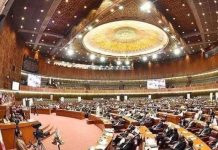DNA
ISLAMABAD, SEPT 29 – The 15th Session of the Shanghai Cooperation Organization (SCO) Forum was held in the format of a video conference. The Forum was chaired by the National Institute for Strategic Studies of the Kyrgyz Republic. Major General Syed Khalid Amir Jaffery, HI(M), (Retd), President CGSS while representing Pakistan delivered the welcoming remarks and speech at the Forum.
Major General Syed Khalid Amir Jaffery, HI(M), (Retd), President CGSS presented speech on the topic “Peace, Stability and Regional Security Cooperation: Cornerstone of Shanghai Cooperation Organization”. He stated that SCO can promote and further expand bilateral and multilateral trade and also the joint implementation of the Belt and Road Initiative, promoting broader and more practical multilateral security cooperation. SCO can enhance international cooperation in providing the impetus to world economic recovery especially after COVID-19.
Furthermore, he stated that it is important to develop an SCO member states’ Cooperation Programme for the Development of Multi-Modal Transport and Logistics Centers. There is a dire need to implement a joint solution for multilateral trade, economic and investment cooperation among the SCO member states. There should be a continuous pursuit of the Sustainable Development Goals till 2030.
A key factor in establishing mutual trust, friendship and neighbourly relations between SCO member States is their People to People Contact and cultural exchange and collaboration in cultural, educational and scientific spheres. Expanding cultural interactions within the SCO region, strengthening mutual understanding among its peoples, respecting their cultural traditions and customs, and preserving and enhancing cultural diversity within SCO member States should remain top priorities for our work aimed at promoting peace and ensuring security and sustainable development.
Adding to his speech, he stated that cooperation between authorities of SCO member States have proved to be fairly successful. Yet in order to effectively combat the drug threat, it will be necessary to consolidate the efforts of the international community as a whole. In this regard, SCO must continue its close collaboration with the United Nations Office on Drugs and Crime. A dedicated setup within SCO to coordinate anti-narcotics activity and liaise with UNODC would be beneficial.
He stated that Pakistan’s inclusion in Shanghai Cooperation Organization (SCO) is optimistically seen as a turning point in the changing geopolitical landscape of the Eurasian belt, as well as bringing new opportunities for Pakistan. The practice of multilateral diplomacy has helped in mitigating regional tensions and augmenting collaboration in the world history, and SCO is the most suitable multilateral forum for Pakistan. SCO has offered opportunities to Pakistan to strengthen its trade relations with Eurasian countries.
Concluding his speech, Major General Syed Khalid Amir Jaffery HI(M), (Retd) extended gratitude to Mr. Vladimir Norov, Secretary-General, SCO for his exceptional work for making SCO, a conducive platform for the member states to maintain peace stability and also to promote cultural, educational and scientific exchange
The delegation from Pakistan also included Ambassador Aizaz Ahmad Chaudhary, Director-General of Institute of Strategic Studies, Islamabad and Dr. Maria Sultan, Chairperson and President of South Asian Strategic Stability Institute Islamabad, Pakistan who also participated and delivered speeches at the Forum.
The event was attended by the heads of research centres that are members of the Forum, as well as representatives of analytical think tanks in the SCO observer states and dialogue partners. The participating countires included Pakistan, Kyrgyz Republic, China, Russia, Tajikistan, Uzbekistan and Kazakhstan.
The participants exchanged views on building sustainable peace and stability in the SCO region, new approaches and multilateral economic cooperation in the SCO space during the pandemic and the role of SCO Forum for cooperation in addressing the challenges of the pandemic.











